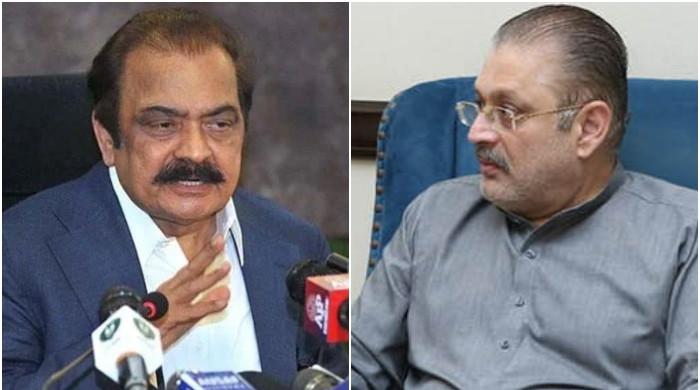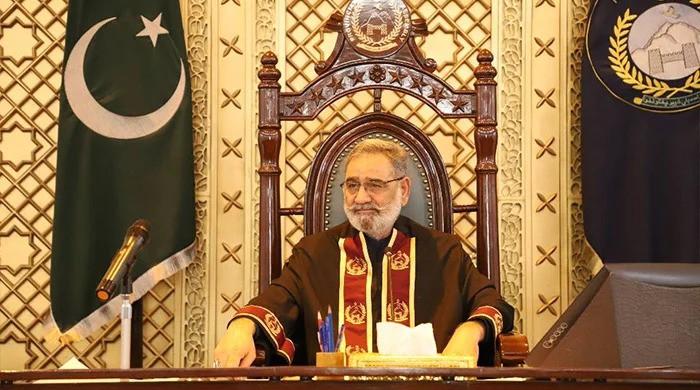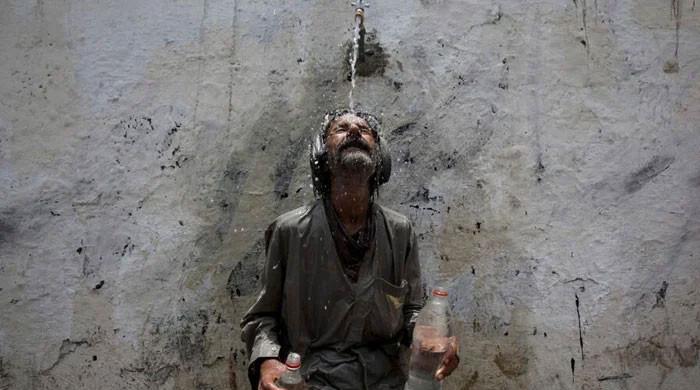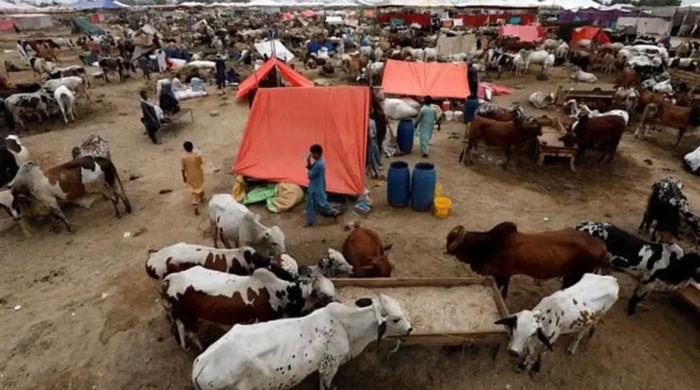Shahzad Akbar unveils govt's comprehensive plan to hold 'sugar daddies' to account
Premier gives approval for NAB to probe the Rs29bn sugar subsidy scandal; regulatory framework to see major overhaul
June 07, 2020
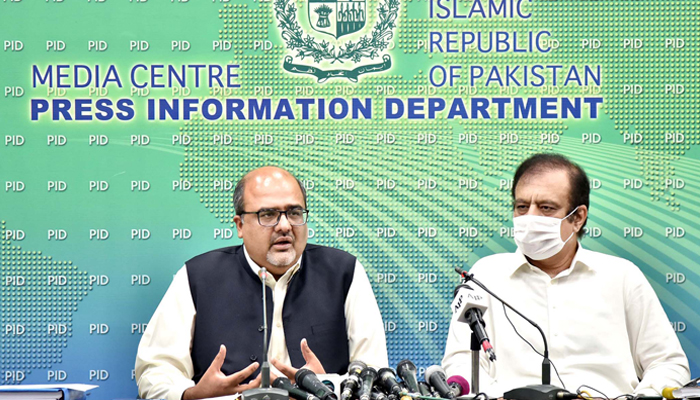
The premier's aide on accountability, Shahzad Akbar, on Sunday unveiled a comprehensive action plan outlined by the government to take to task the "sugar daddies" identified by the sugar inquiry commission as well as for an overall overhauling of the regulatory framework which had all the while "been in cahoots with the sugar mills".
"Imran Khan was given a mandate for accountability in 2018. His 22-year political struggle has been for the same. For accountability of the powerful and influential. This was a big test for that mandate," said Akbar, during a press conference in Islamabad alongside information minister Shibli Faraz.
Referring to the all parties conference called by the PPP in Punjab, Akbar went on to say: "This is not an all parties conference, it is an all sugar daddies conference."
Akbar said that no matter how powerful a person is, no matter the party he belongs to, or however wealthy, "no exceptions can be created" for anyone, and this was the line of inquiry followed by the probe commission.
"Transparency is of utmost importance when it comes to accountability. Before we take action over whatever matter is being pursued, it must be put before the people. That is why the report was made public," said the premier's aide.
He said the public, farmers, as well as industrial experts had been consulted over an “action matrix” that was developed.
Akbar said that the prime minister had approved three sets of actions during a meeting in Bani Gala earlier in the day, which he then proceeded to delineate.
Penal actions, recoveries
These actions form the first set of actions approved by the premier and consist of the punishments to be given as well as the recovery mechanism to be enacted. Within the broad category, seven major actions were recommended.
1. Investigation of subsidy scandal
Akbar said that the matter of the Rs29bn subsidy scandal will be forwarded to the National Accountability Bureau. “NAB will conduct a criminal investigation to probe who gave the subsidy.”
He said that availing an approved subsidy will not be considered illegal unless with the subsidy some unlawful action was taken. “The factories which violated any terms, which the report shows were almost all factories, will also fall within NAB’s jurisdiction.”
He highlighted the subsidies given since 2014 — Rs6.5bn subsidy for 2014-15, Rs6.5bn subsidy for 2015-16 and a record Rs20bn subsidy for 2016-17 and said that NAB will proceed to file cases for all these instances.
He said that besides the above subsidies approved by the federal government, the Sindh government had also approved a subsidy of Rs4.1bn which too will be investigated by NAB for factors such as cost of production not being determined and no justifiable reason given for the subsidies.
Akbar said that the subsidy in 2018-19 was given by Punjab government, a matter which is also being handed over to NAB to investigate. “If someone has played a role, they will be prosecuted under Section 9 of the National Accountability Ordinance.”
He said another important decision taken was that under NAB laws, which came into effect in 1985, in the last 25 years all subsidies that were given will be probed and a court reference must be filed for the same.
“In 1990, these big political families came and installed their mills under a quota system. One family had dozens of sugar mills and then they themselves would give subsidies. They exported copious amounts of sugar to India and received a lot of subsidy," said the aide, adding that this entire matter was also being forwarded to NAB so it may file a reference.
He said that so far the names of nine mills had come to light, but in fact, there are around 80 mills which shall all be audited.
2. Investigation of income and sales tax fraud, evasion and benami transactions
Akbar said the matter of sales tax fraud is being forwarded to the Federal Board of Revenue.
He said that evidence of of sales tax fraud, payment of a lower income tax, and benami transactions has been found in the five year audit of sugar mills carried out by the probe commission. “This matter is being handed over to FBR so recoveries can be made.”
He said that the tax authority is being given 90 days to prepare a report and determine the cases to be filed and must carry out recoveries in the same time frame.
Akbar said that a Rs30bn sales tax fraud was already found in the audit of nine mills but FBR will now have to probe the other 80 or so mills. “A sizeable amount of recoveries can be made this way which will be deposited in the national exchequer.”
He said the office of the special assistant to the prime minister on accountability will monitor the monthly progress made by FBR.
3. Investigation of cartelisation
The aide on accountability said the matter of investigating the cartelisation of various commodities is being assigned to the competition commission of Pakistan.
"It is the regulator, the watchdog which has to ensure there is no cartelisation. This pack of wolves who rob the people and do as they please and violate rules of fair competition [will be thoroughly probed]."
He said that over the past 12 years, the commission had been a "total failure" but many changes had recently been brought to it.
"People were unlawfully appointed and would obtain a stay order. We have had these removed," he said, adding that a brand new team will submit a report within 90 days on sugar cartelisation.
"Those involved in cartelisation will be fined under the commission's laws and recoveries will be made as well."
4. Inquiry and investigation of export proceeds, loan defaults, write offs and sale of pledge stocks
This matter will be assigned to the State Bank of Pakistan to probe within 90 days. Matters such as showing fake exports and obtaining subsidies will be investigated.
He said the fraud also encompasses any whitening of foreign remittance after not carrying out export activities.
Akbar said evidence of loan defaults and write offs was also found by the sugar probe commission. "When wilfull default is discovered the State Bank sends the matter to NAB."
He said that nearly all the sugar mills were also found involved in pledging a stock and later selling it.
The State Bank will impose fines and also make recoveries after which it will submit a report to the federal government via the finance ministry.
5. Investigation of corporate fraud
Akbar said that within public limited companies such as JDW as well as private companies, instances of fraud with shareholders and of stocks has been detected besides underwriting, over invoicing. He said a team comprised of officials of the Federal Investigation Agency and the Securities and Exchange Commission of Pakistan will be probing these matters.
"They will submit a report within 90 days for the purpose of investigation for their own proceedings and will file cases within the relevant courts," he said.
6. Investigation of potentially fake exports to Afghanistan and money laundering
The premier's aide said that the matter is being forwarded to FIA. The sugar commission report has clear evidence of sugar exports to Afghanistan which have highlighted huge gaps of information.
"A truck which can only bear load of 15-20 tonnes, was quoted in receipts showing 80 tonne loads," Akbar said.
Every sugar mill be investigated for their exports to Afghanistan, he said, adding that there was a substantial difference in the sugar that was sent from Pakistan and that which reached Afghanistan.
"There is an element of money laundering in it as the sugar did not reach there but the money came here. That black money was whitened and will be probed."
7. Breach of provincial laws
He said that many sugar mills did unlawful capacity enhancement. When they had a licence to produce 8,000 metric tonnes of sugar, they enhanced their facilities and the additional sugar being produced was not recorded in any books.
This is a breach of provincial laws. But the more grave issue is the lower payment of sugar cane to farmers and a reduced rate applied when weighing sugar cane.
Speaking of road cess, which is spent on developing the area infrastructure, he said fraud was found there as well.
He said all the aforementioned matters will be probed by the Anti Corruption Establishments of all the three provinces, Khyber Pakhtunkhwa, Punjab and Sindh and cases must be registered within 90 days.
Overhaul of regulatory framework
Akbar said recommendations have been made to ensure that the fraud committed is never again found possible to commit.
He said that with the use of IT, IR codes on sugar sacks, and a change in laws which sees that illegal forward sales are not done, it is hoped a major overhaul of the regulatory framework can be brought about.
"We have also recommended online stocking tied to FBR so that when a sugar sack leaves the factory we should have details such as barcodes to keep a track."
Plan of action for sugar prices
He said for the first time an independent assessment of the cost of sugar production had been conducted, whereas previously the cost was set by the sugar mills association.
"This has an effect on the subsidy and also on the market price of sugar."
Akbar said that under the Minister for Industries Hammad Azhar a committee will be formed which will oversee the sugar policy and will rationalise the market prices according to the cost of production determined by the commission.
He will also undertake the task of provincial coordination so that immediate relief to the people can be provided.




